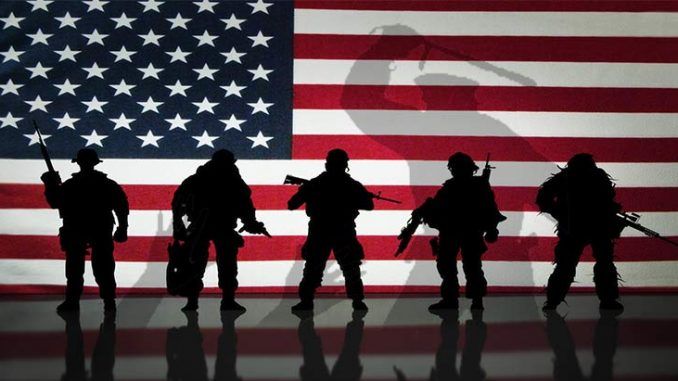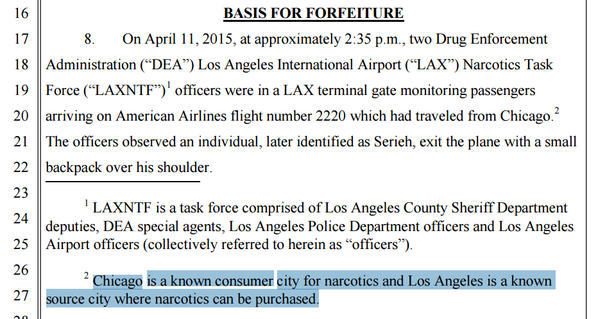
A government document reveals that citizens travelling anywhere within the United States are exhibiting “suspicious behaviour” and can be hassled by law enforcement officers.
USA Today’s Brad Heath revealed that a footnote in an asset forfeiture filing made the assertion that traveling from Chicago to Los Angeles is considered a suspicious activity.
Techdirt.com reports:

BYPASS THE CENSORS
Sign up to get unfiltered news delivered straight to your inbox.
You can unsubscribe any time. By subscribing you agree to our Terms of Use

If you can’t see the embed, the government’s footnoted assertion reads:
Chicago is a known consumer city for narcotics and Los Angeles is a known source city where narcotics can be purchased.
Also of note: suspect had a backpack, an item used to carry stuff — something no legitimate traveler would possess.
Turns out this sort of ridiculous assertion isn’t limited to this particular filing. Law enforcement agencies are of the firm belief that traveling between any cities where drugs might be “consumed” (which would be every city in the US) and any cities where drugs might be sold (again, the list is long and inclusive) is a healthy indicator of drug-related activity.
The following map lists “known” drug “source” [red] and “destination” [blue] cities, along with links to relevant court filings or statements by law enforcement officials. Pretty much traveling from any large city to anywhere else could be construed as a drug run.
Even though the courts are sometimes unimpressed by this facet of reasonable suspicion, it’s still routinely used to justify searches of all things.
Once we discount the facts with which we find weaknesses, we are left with Green’s arrival on a plane from a known source city, and her vagueness about the purpose of her trip. These facts are insufficient to demonstrate a reasonable articulable suspicion of criminal activity.
Given that nearly every stretch of interstate is considered a drug corridor, the fact that a stop occurred on any such route is almost meaningless. See United States v. Wisniewksi, 358 F. Supp. 2d 1074, 1093 (D. Utah 2005) (“[T]raveling on a ‘drug corridor’ cannot reasonably support a suspicion that the traveler is carrying contraband. To so hold would give law enforcement officers reasonable suspicion that every vehicle on every major—and many minor—thoroughfares throughout this country was transporting drugs.”), aff’d, 192 Fed. App’x 749 (10th Cir. 2006). Furthermore, because of courts’ willingness to designate various cities and states as “source” regions for narcotics, it is likely that most major roads in this country could be considered drug corridors. See Foreman, 369 F.3d at 795 (Gregory, J., concurring in part and dissenting in part); United States v. Beck, 140 F.3d 1129, 1138 n.3 38 (8th Cir. 1998) (citing cases recognizing, inter alia, Colorado, Texas, Florida, Arizona, the entire West Coast, New Jersey, New York City, Phoenix, Fort Lauderdale, Houston, Chicago, and Dallas as drug source cities or states); State v. Quirk, 842 N.E.2d 334, 343 (Ind. 2006) (“[C]onsidering the substantial number of states and cities that have been designated as sources of drugs, a motorist, in our highly mobile society, would be hard pressed not to travel either from, to, or through a drug-source jurisdiction.”).
Speaking of which, if you’re not flying, you’re probably driving. Nearly every major highway in the US can be considered a “drug corridor,” depending on who you ask. These “drug corridors,” also known as “interstate highways,” are prime trolling spots for asset forfeiture. Traveling along these roads subjects out-of-state travelers to instant suspicion and warrantless searches, simply because these roads are also used by drug traffickers. Good luck avoiding using one of these highways during a road trip.
Now, some of you might be saying, “Every one of these cases cited resulted in a law enforcement officer finding drugs! They’re right to be so suspicious!” Well, arrestees have more motivation than most to challenge the constitutionality of a search. Many innocent people who have been illegally searched simply because they’re on one of these roads/in any major airport won’t file a lawsuit. In fact, many people probably believe law enforcement has the right to search people and vehicles simply because of their originating cities and/or destinations. On top of that, many searches and seizures are tied to asset forfeiture, where no conviction is ever obtained and the amount of money seized suddenly seems unimportant when a lawyer informs someone they’d need $5000 or so to even consider fighting the uphill battle to liberate the seized funds.
And if you don’t believe me, here’s Eighth Circuit Appeals Court Chief Judge Richard Arnold — from all the way back in 1992 — explaining the dangers inherent to viewing travellers as drug traffickers simply because of where they’re going or where they’ve come from.
The White opinion is less than three years old, and none of our cases decided since that time has questioned it or thrown doubt upon it in any way. There are differences between the present facts and those in White, to be sure, as there always are, but the differences, on balance, do not place this search and seizure appreciably closer to the line of legality than what happened in White. Like Weaver, White was “very nervous,” he arrived from a source city, the flight was early in the morning, and White had no checked luggage. Some of the facts in White, indeed, appear stronger than the present case: for example, White had purchased his ticket with cash, and it was a one-way ticket. The agents did not know whether Weaver had bought his ticket for cash or not, or whether it was one way. Weaver did not have a copy of his ticket, but sometimes innocent people lose their tickets, to say nothing of ticket coupons which may be of no further use to them. I have lost tickets myself. Weaver had no identification, or at least declined to produce any, but this was his undoubted right: we have not yet come to the point in this country (except maybe in airports) when citizens must identify themselves to public employees.
[…]
Airports are on the verge of becoming war zones, where anyone is liable to be stopped, questioned, and even searched merely on the basis of the on-the-spot exercise of discretion by police officers. The liberty of the citizen, in my view, is seriously threatened by this practice. The sanctity of private property, a precious human right, is endangered. It’s hard to work up much sympathy for Weaver. He’s getting what he deserves, in a sense. What is missing here, though, is an awareness that law enforcement is a broad concept. It includes enforcement of the Bill of Rights, as well as enforcement of criminal statutes. Cases in which innocent travelers are stopped and impeded in their lawful activities don’t come to court. They go on their way, too busy to bring a lawsuit against the officious agents who have detained them. If the Fourth Amendment is to be enforced, therefore, it must be by way of motions to suppress in cases like this.
This is America, post-declaration of (drug) war. This has been 40 years in development. Now, we’ve added the faulty assumptions of the post-9/11 “national security above all” mindset to it. Traveling from anywhere to anywhere is to invite the suspicions of our nation’s domestic “warriors” who patrol our airports and highways, ever-vigilant for the opportunity to rip open luggage or toss a rented car in hopes of finding drugs… or better yet, cold, hard cash.


So…let me get this right. Our all great leaders have made it so that it is too dangerous to travel outside of our country, and now they want to make it illegal to travel inside our country?? Seems to me that some of these so called “Law Enforcement” officials, are taking it one step over the line. Perhaps it would be better for law enforcement to be replaced by government forces. I know that ALL of our law enforcement in this area, are still very democrat. I asked a cop who he was going to vote for, and he said, “Whoever my captain votes for.” Really?